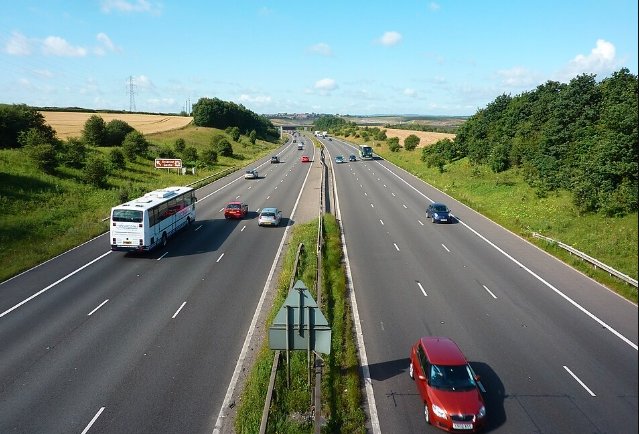Ash Regan wants a new motorway. Critics say it’s a fantasy. Scotland’s transport priorities are under fire, and the clock is ticking on climate targets.
The Alba Party MSP thinks Scotland needs more tarmac. Specifically, another motorway to boost connectivity. But others are slamming the brakes, calling the proposal expensive, unnecessary, and stuck in the past. As the debate heats up, so does the spotlight on how Scotland manages its transport future in the middle of a climate crisis.
Regan’s Roadmap Sparks Immediate Pushback
Ash Regan, a former SNP minister turned Alba Party MSP, dropped her motorway idea into the political arena like a stone in a loch. It made waves. Big ones.
She argued that better roads are essential for growth. Her proposal? A new motorway slicing through rural Scotland, connecting cities and opening up new economic zones. It’s a bold pitch.
But bold doesn’t mean popular.
In fact, the backlash was swift and unforgiving. Critics from Green MSPs to climate campaigners labeled it “tone-deaf” and “absurd.” Even some in her own party seemed uneasy with the scale — and timing — of such a suggestion.

The Ghost of Ernest Marples Looms
Here’s where things get weird. Regan’s critics have started invoking a ghost from the past: Ernest Marples.
Marples was Britain’s transport minister in the 1960s. He oversaw a motorway boom, helped axe railway lines, and later fled the country in scandal. He also introduced a drink-driving ban… only to be arrested for drink-driving himself. Yes, really.
So when commentators say “Remember Marples,” it’s not just a history lesson. It’s a warning. About priorities. About hypocrisy. About what happens when transport policy turns into personal ambition.
Just one sentence: Regan might want to be careful what history books remember her for.
Climate Targets vs Concrete Plans
Here’s the elephant on the asphalt: Scotland has legally binding net-zero climate goals.
And a motorway? That’s about as far from net-zero as it gets. According to Transport Scotland’s own figures, surface transport accounts for just under 25% of the nation’s carbon emissions. Emissions from cars have barely budged in 30 years.
The Scottish Government has already admitted it’s not on track. So critics argue building another motorway would only make things worse.
Here’s what that tension looks like in raw numbers:
| Category | Emissions Share (Scotland) | Trend Since 1990 |
|---|---|---|
| Surface Transport (Total) | 24.7% | Flat |
| Road Freight & Goods | 6.2% | Up |
| Private Car Use | 17.5% | Flat |
| Rail | <1% | Down |
The data’s pretty grim.
Is Anyone Really Asking for This?
Most people don’t wake up thinking, “You know what Scotland needs? Another motorway.” In fact, polling shows transport priorities lie elsewhere.
Take the 2023 Ipsos MORI Scotland attitudes survey. When asked what should be improved first in transport:
-
46% said public transport reliability
-
29% said better cycle and pedestrian paths
-
Just 11% said new roads or motorways
That last number is telling. Even among rural voters — Regan’s supposed target demographic — appetite for another mega-road is lukewarm at best.
And it’s not just the public. Transport experts have questioned the “benefit-to-cost” of motorway projects. Professor Iain Docherty, one of Scotland’s leading transport academics, warned last year that “big new roads almost never deliver the growth they promise.”
Politics or Planning?
Here’s the thing. Regan’s motorway pitch might not be about roads at all. It might be about relevance.
Since defecting from the SNP and joining Alba, she’s struggled to make headlines. The motorway idea changed that. For a few news cycles at least, everyone was talking about her.
But transport policy isn’t a PR stunt. It shapes communities, health, economics. And it costs a fortune.
Motorways don’t come cheap. A new dual carriageway between Perth and Inverness was estimated to cost £3 billion. That’s not a typo. Three. Billion. Pounds.
Could that money be better spent elsewhere? It’s a question even her supporters aren’t rushing to answer.
One sentence again: This might be less about laying tarmac and more about laying political groundwork.
Green Campaigners Aren’t Mincing Words
The reaction from environmental groups? Scathing.
Friends of the Earth Scotland called the idea “outdated and destructive.” Stop Climate Chaos Scotland said it was “embarrassing.” Even the Scottish Green Party, currently in coalition with the SNP, issued a strongly worded statement slamming the proposal as “dangerous.”
And they’ve got receipts. According to their calculations, the carbon cost of a single kilometre of new motorway could outweigh decades of bus improvements. Their argument is blunt: this isn’t just about emissions — it’s about priorities.
Campaigners argue that investing in walking, cycling, and buses gives you:
-
Better value for money
-
Lower emissions
-
Greater health benefits
-
More inclusive access to transport
The message from green groups? Roads are old news. We’ve got bigger problems.
A Wider Pattern of Political Drift
Regan’s motorway isn’t an isolated idea. It’s part of a broader shift happening in parts of Scottish politics — away from climate commitments, and toward populist promises.
You can see it in the rise of Reform UK’s Scottish branch. You can see it in rural councils backing more car-led infrastructure. You can even see it in UK Labour’s plans to revisit road-building pledges.
But here’s the problem: once the cement’s poured, you can’t unbuild a road.
That permanence makes the stakes incredibly high. Transport policy locks in behaviours for generations. Build for cars, and you get cars. Build for buses, and you get buses. It’s that simple.
And right now, Scotland’s walking a tightrope between old habits and new challenges.


















